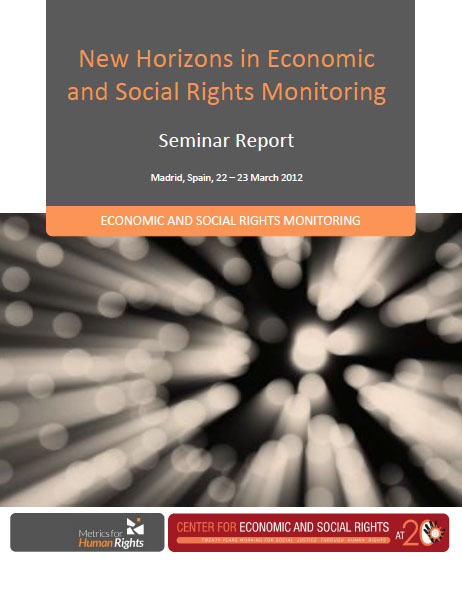
Introduction Agenda Presenters Papers & presentations The OPERA Framework
A newly-published report detailing all the presentations made at this event and providing commentary
on the main issues that emerged from discussions can be accessed here.
Assessing how a state’s economic and social policies comply with its human rights obligations has involved operationalizing complex and multifaceted principles such as ‘progressive realization’, ‘maximum available resources’, ‘minimum core obligations’ and ‘non-discrimination’. There is now a growing body of innovative monitoring tools and techniques, both qualitative and quantitative, which have been developed to meet this challenge, including the use of human rights indicators, indices and benchmarks, budget analysis and human rights impact assessment methodologies.
 Rights-based policy monitoring requires a comprehensive, multidimensional approach to assessing ESCR fulfillment, integrating quantitative and qualitative methods. Despite much progress, many of the tools and techniques for monitoring have been developed in a fragmented way and in isolation from one another. It is with these critical issues in mind that CESR and Metrics for Human Rights in Development organized an international meeting in Madrid. The two-day event, entitled New Horizons in Economic and Social Rights Monitoring, took place on the 22 and 23 of March in the heart of the Spanish capital, Madrid. The meeting responded to the need to monitor ESC rights compliance through innovative, multifaceted and comprehensive approaches, always with the end goal to promote social justice through more effective human rights accountability
Rights-based policy monitoring requires a comprehensive, multidimensional approach to assessing ESCR fulfillment, integrating quantitative and qualitative methods. Despite much progress, many of the tools and techniques for monitoring have been developed in a fragmented way and in isolation from one another. It is with these critical issues in mind that CESR and Metrics for Human Rights in Development organized an international meeting in Madrid. The two-day event, entitled New Horizons in Economic and Social Rights Monitoring, took place on the 22 and 23 of March in the heart of the Spanish capital, Madrid. The meeting responded to the need to monitor ESC rights compliance through innovative, multifaceted and comprehensive approaches, always with the end goal to promote social justice through more effective human rights accountability
Hosted by the Center for Economic and Social Rights (CESR), the meeting served as the third annual meeting of the International Network on Quantitative Methods for Human Rights and Development – Metrics for Human Rights. The seminar drew on the lessons learned from a wide array of key experts and activists thus breaking down the disciplinary silos that often hamper human rights advocates from fully gaining knowledge from one another to enhance the field of ESCR monitoring. The monitoring methods, techniques and frameworks presented at the seminar can serve as powerful tools for human rights advocacy work. As such, the seminar drew on experiences that have successfully demonstrated how monitoring can be used to bring about effective policy change, enhance enforcement and accountability, and most crucially, improve the livelihoods of people on the ground.
The meeting took stock of progress made and current challenges in the field of ESC rights monitoring, and brought together human rights and development practitioners who have been grappling with the methodological challenges of monitoring the positive obligation to fulfill economic and social rights.